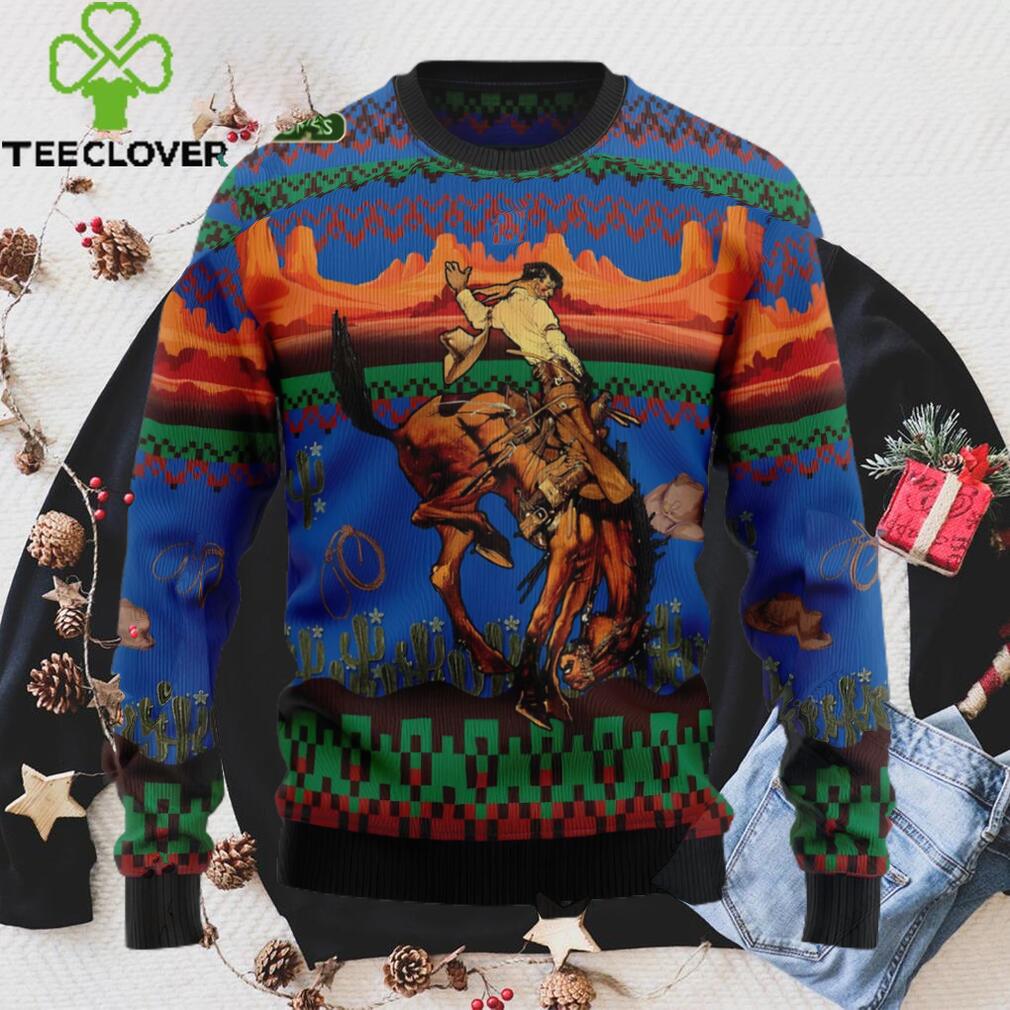Size Guide
Unisex Standard T-Shirt
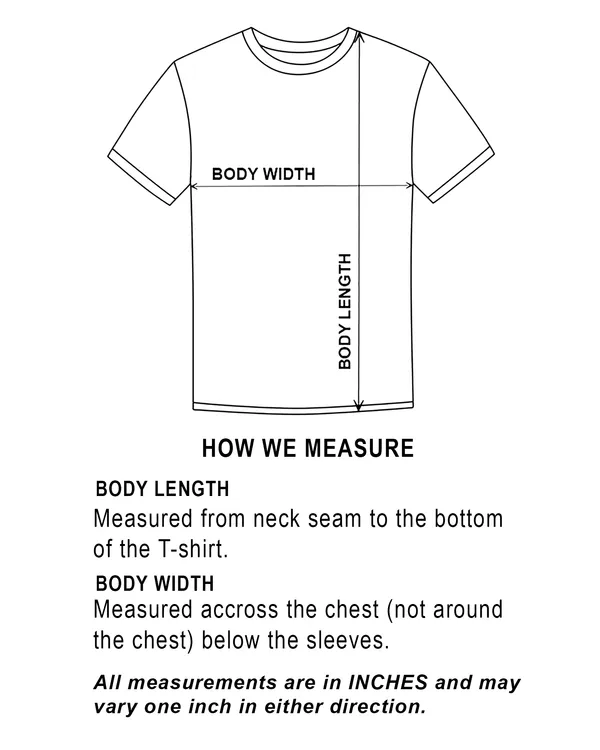
| Size | Chest Width | Shirt Length |
|---|---|---|
| S | 18 in | 28 in |
| M | 20 in | 29 in |
| L | 22 in | 30 in |
| XL | 24 in | 31 in |
| 2XL | 26 in | 32 in |
| 3XL | 28 in | 33 in |
| 4XL | 30 in | 34 in |
| 5XL | 32 in | 35 in |
Unisex Hoodie
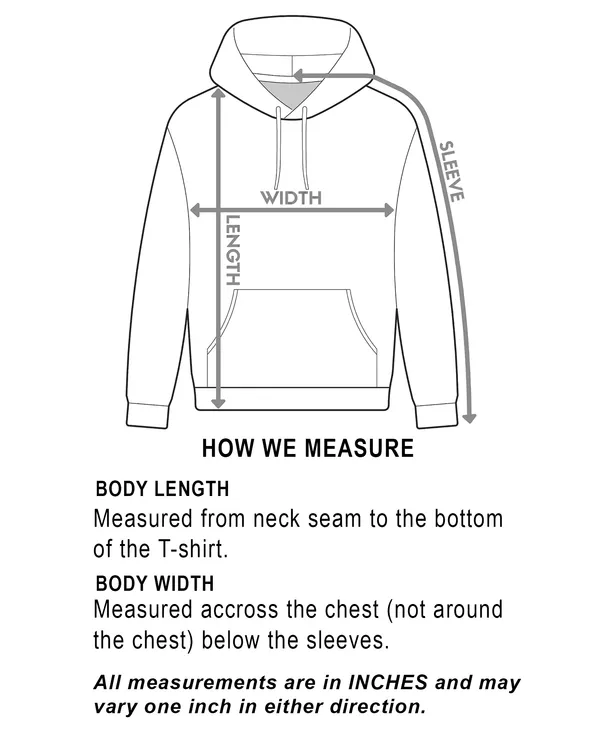
| Size | Chest Width | Shirt Length | Sleeve Length |
|---|---|---|---|
| S | 20 in | 27 in | 33.5 in |
| M | 22 in | 28 in | 34.5 in |
| L | 24 in | 29 in | 35.5 in |
| XL | 26 in | 30 in | 36.5 in |
| 2XL | 28 in | 31 in | 37.5 in |
| 3XL | 30 in | 32 in | 38.5 in |
| 4XL | 32 in | 33 in | 39.5 in |
| 5XL | 34 in | 34 in | 40.5 in |
Unisex Sweatshirt
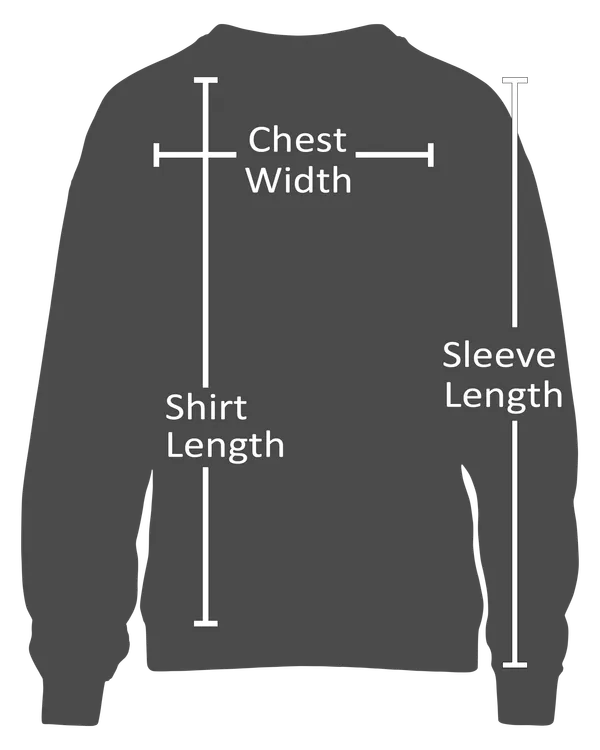
| Size | Chest Width | Shirt Length | Sleeve Length |
|---|---|---|---|
| S | 20 in | 27 in | 33.5 in |
| M | 22 in | 28 in | 34.5 in |
| L | 24 in | 29 in | 35.5 in |
| XL | 26 in | 30 in | 36.5 in |
| 2XL | 28 in | 31 in | 37.5 in |
| 3XL | 30 in | 32 in | 38.5 in |
| 4XL | 32 in | 33 in | 39.5 in |
| 5XL | 34 in | 34 in | 40.5 in |
Men’s Zip Hoodie
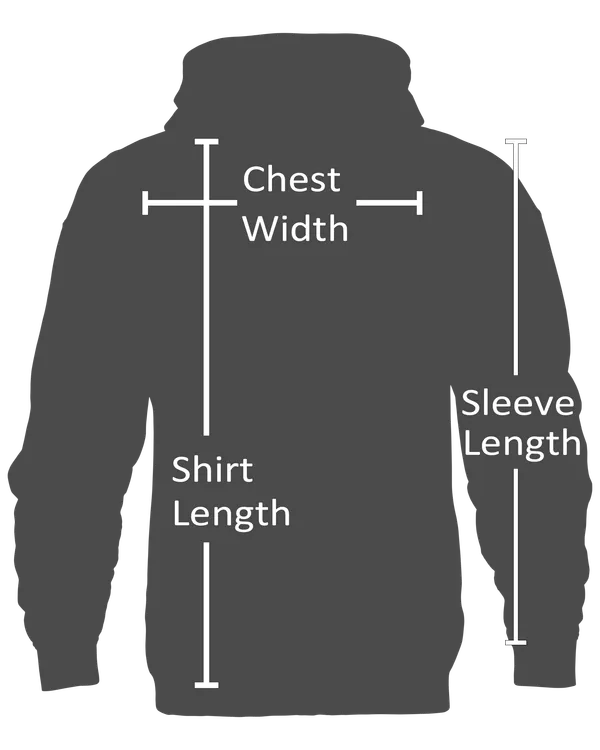
| Size | Chest Width | Shirt Length | Sleeve Length |
|---|---|---|---|
| S | 19.25 in | 27 in | 33.5 in |
| M | 21.25 in | 28 in | 34.5 in |
| L | 23.25 in | 29 in | 35.5 in |
| XL | 25.25 in | 30 in | 36.5 in |
| 2XL | 27.25 in | 31 in | 37.5 in |
Men’s Long Sleeved T-Shirt
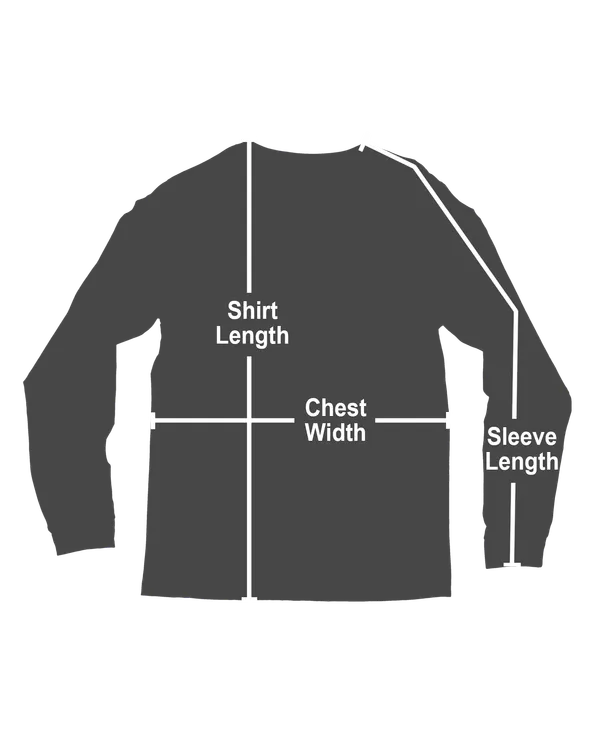
| Size | Chest Width | Shirt Length | Sleeve Length |
|---|---|---|---|
| S | 18 in | 27.5 in | 31.75 in |
| M | 20 in | 28.75 in | 33.5 in |
| L | 22 in | 29.75 in | 35.25 in |
| XL | 24 in | 30.75 in | 36.75 in |
| 2XL | 26 in | 32 in | 38.25 in |
Men’s V-Neck T-Shirt
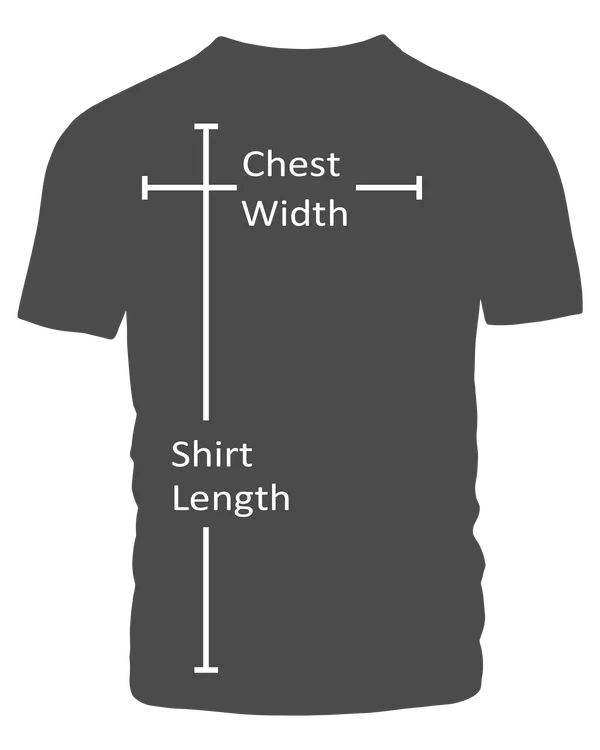
| Size | Chest Width | Shirt Length |
|---|---|---|
| S | 18 in | 27.5 in |
| M | 20 in | 28.75 in |
| L | 22 in | 29.75 in |
| XL | 24 in | 30.75 in |
| 2XL | 26 in | 32 in |
Men’s Tank Top
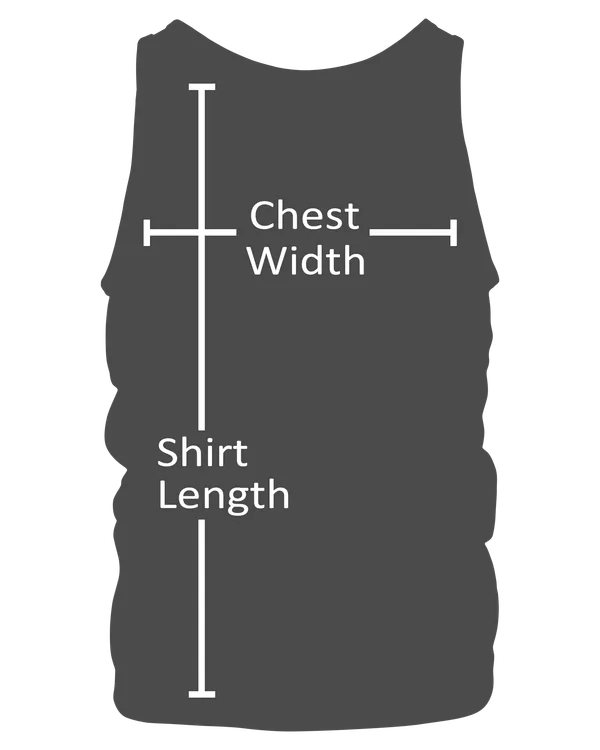
| Size | Chest Width | Shirt Length |
|---|---|---|
| S | 18 in | 28 in |
| M | 20 in | 29 in |
| L | 22 in | 30 in |
| XL | 24 in | 31 in |
| 2XL | 26 in | 32 in |
Ladies Long Sleeve T Shirt
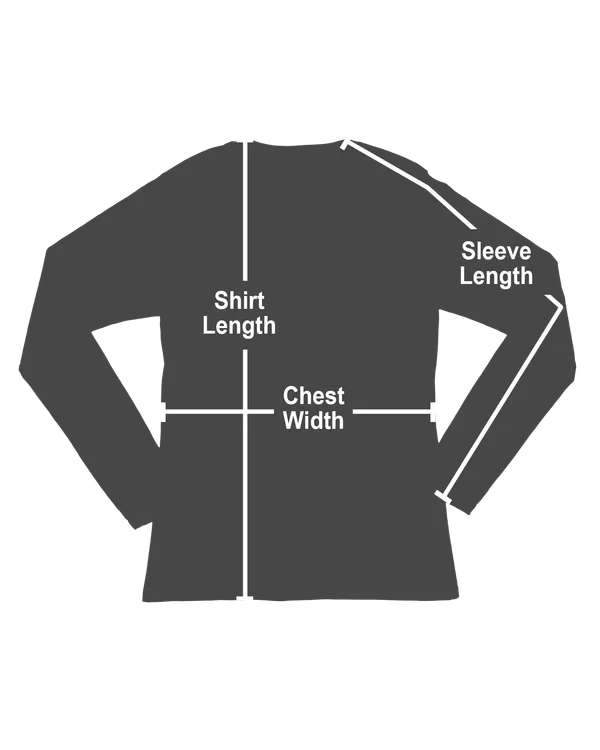
| Size | Chest Width | Shirt Length | Sleeve Length |
|---|---|---|---|
| S | 16 in | 25.25 in | 30.25 in |
| M | 17 in | 26.25 in | 31.25 in |
| L | 18.5 in | 27.25 in | 32.75 in |
| XL | 19.5 in | 28 in | 34.25 in |
| 2XL | 22 in | 28.5 in | 35.25 in |
Ladies T Shirt

| Size | Chest Width | Shirt Length | Sleeve Length |
|---|---|---|---|
| S | 17.25 in | 25.5 in | 13.25 in |
| M | 19.25 in | 26 in | 14 in |
| L | 21.25 in | 27 in | 14.75 in |
| XL | 23.25 in | 28 in | 15.75 in |
| 2XL | 25.25 in | 28.5 in | 16.75 in |
| 3XL | 27.25 in | 29 in | 17.5 in |
Ladies Hooded Sweatshirt

| Size | Chest Width | Shirt Length | Sleeve Length |
|---|---|---|---|
| S | 20 in | 26 in | 32 in |
| M | 22 in | 27.5 in | 33 in |
| L | 24 in | 28 in | 34.5 in |
| XL | 26 in | 29.5 in | 35.5 in |
| 2XL | 28 in | 30 in | 37 in |
Ladies Tank Top
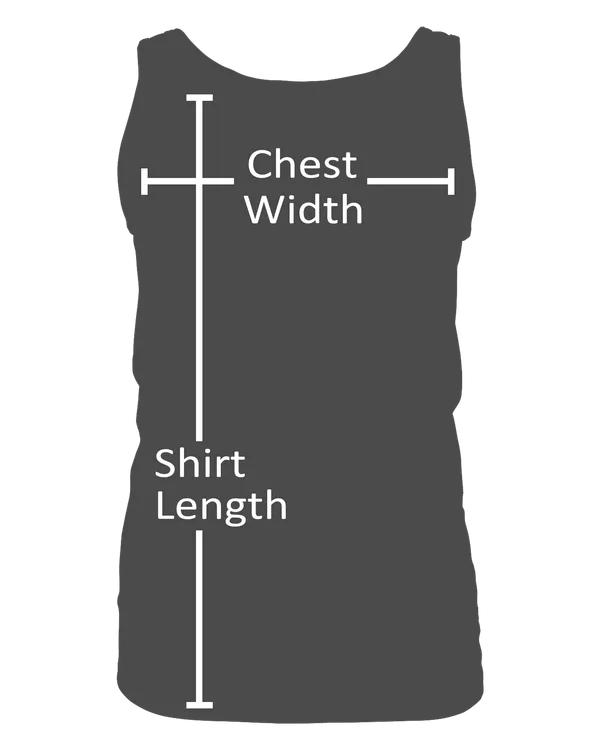
| Size | Chest Width | Shirt Length |
|---|---|---|
| S | 16.5 in | 25.25 in |
| M | 17.5 in | 26.25 in |
| L | 19 in | 27.25 in |
| XL | 20 in | 28 in |
| 2XL | 22.5 in | 28.5 in |
Ladies V Neck T Shirt
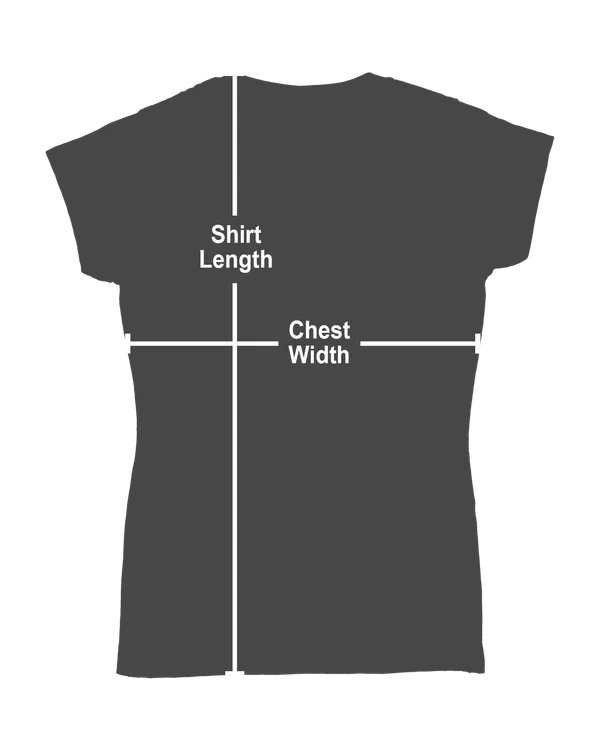
| Size | Chest Width | Shirt Length |
|---|---|---|
| S | 16 in | 25.25 in |
| M | 17 in | 26.25 in |
| L | 18.5 in | 27.25 in |
| XL | 19.5 in | 28 in |
| 2XL | 22 in | 28.5 in |
| 3XL | 23 in | 29 in |
Youth T Shirt
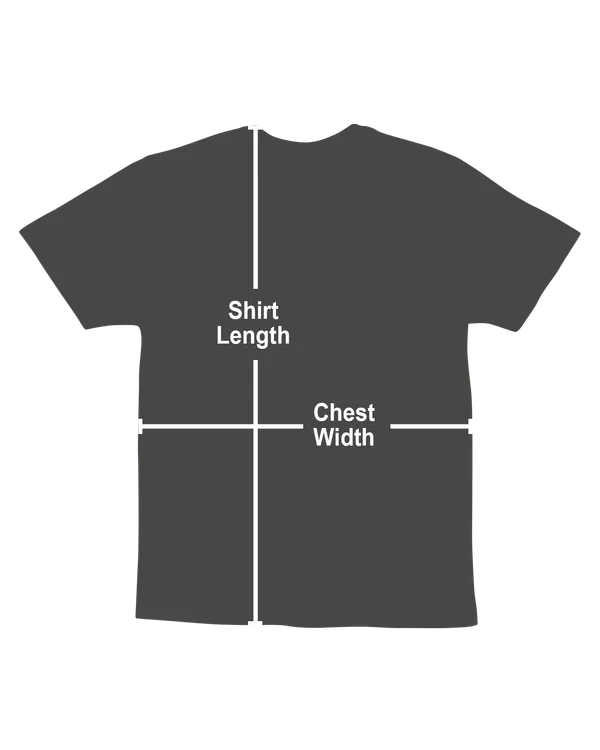
| Size | Chest Width | Shirt Length | Sleeve Length |
|---|---|---|---|
| XS (4-5 years) | 16 in | 20.5 in | 13.5 in |
| S (6-7 years) | 17 in | 22 in | 14.5 in |
| M (8-9 years) | 18 in | 23.5 in | 15.5 in |
| L (10-11 years) | 19 in | 25 in | 16.5 in |
| XL (12-13 years) | 20 in | 26.5 in | 17.5 in |
Mug


Twill Cap

| 360 Crown | Front Crown |
|---|---|
| 22.24 in | 12.6 in |
| Visor’s Length | Visor’s Width |
|---|---|
| 6.69 in | 4.53 in |
Tumbler



Cloth Face Mask


Baseball Jersey Shirt
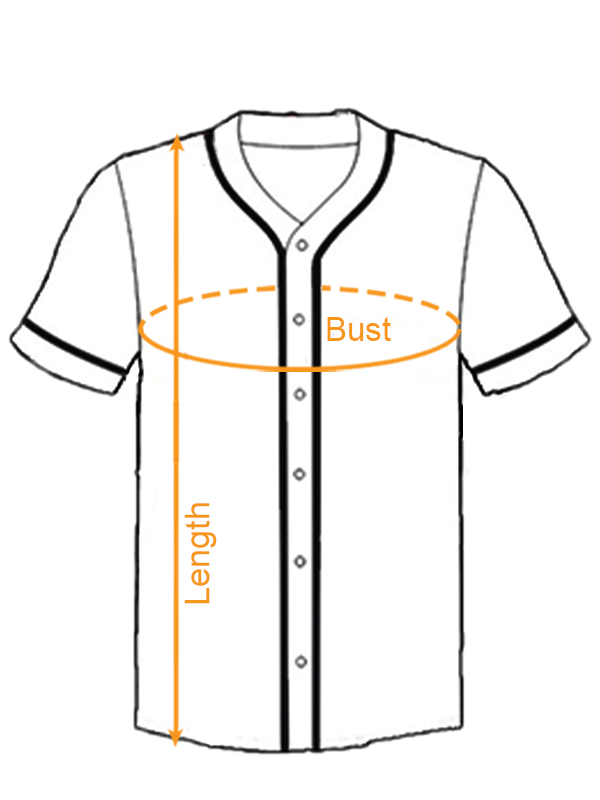
| Size | Length | Bust | Shoulder |
|---|---|---|---|
| S | 29.92 in | 34.65 in | 14.96 in |
| M | 30.31 in | 37.8 in | 16.14 in |
| L | 30.71 in | 40.94 in | 17.32 in |
| XL | 31.1 in | 44.09 in | 18.5 in |
| 2XL | 31.5 in | 48.03 in | 19.69 in |
| 3XL | 31.89 in | 51.97 in | 20.87 in |
| 4XL | 32.28 in | 55.91 in | 22.05 in |
| 5XL | 32.68 in | 59.84 in | 23.23 in |
Basketball Jersey Tank

| Size | Length | Bust |
|---|---|---|
| S | 32.68 in | 34.65 in |
| M | 33.07 in | 37.8 in |
| L | 33.46 in | 40.94 in |
| XL | 33.86 in | 44.09 in |
| 2XL | 34.65 in | 48.82 in |
| 3XL | 35.83 in | 53.54 in |
Basketball Suit

| Size | Length | Bust | Shoulder | Pant Lengths | Waist | Hip |
|---|---|---|---|---|---|---|
| XS | 24.8 in | 36.22 in | 13.39 in | 18.11 in | 23.62 in | 38.58 in |
| S | 25.79 in | 37.8 in | 13.78 in | 18.9 in | 25.2 in | 40.16 in |
| M | 26.77 in | 39.37 in | 14.17 in | 19.69 in | 26.77 in | 41.73 in |
| L | 27.76 in | 40.94 in | 14.57 in | 20.47 in | 28.35 in | 43.31 in |
| XL | 28.74 in | 42.52 in | 14.96 in | 21.26 in | 29.92 in | 44.88 in |
| 2XL | 29.72 in | 44.09 in | 15.35 in | 22.05 in | 31.5 in | 46.46 in |
| 3XL | 30.71 in | 45.67 in | 15.75 in | 22.83 in | 33.07 in | 48.03 in |
| 4XL | 31.69 in | 47.24 in | 16.14 in | 23.62 in | 34.65 in | 49.61 in |
| 5XL | 33.07 in | 48.82 in | 16.54 in | 32.28 in | 36.22 in | 51.18 in |
Hawaiian Shirt
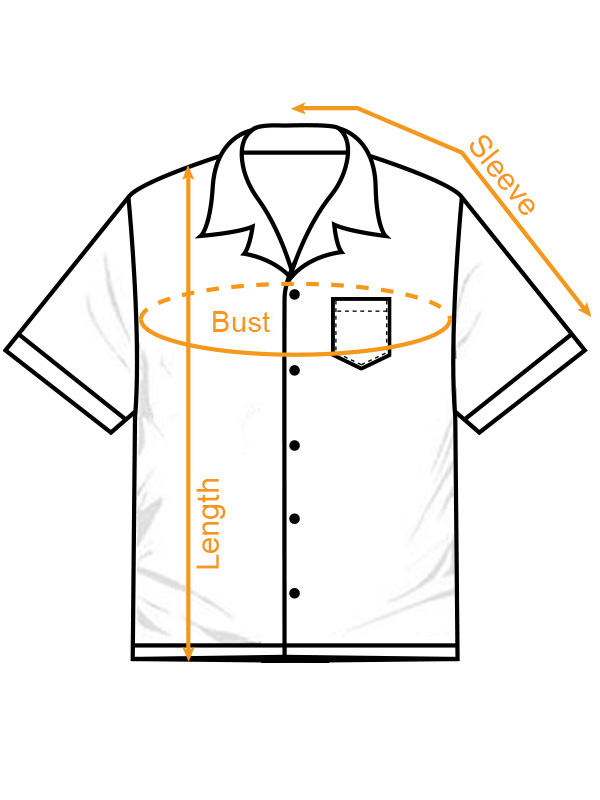
| Size | Length | Bust | Sleeve |
|---|---|---|---|
| XS | 32.99 in | 37.8 in | 16.54 in |
| S | 33.98 in | 40.94 in | 17.32 in |
| M | 28.74 in | 44.09 in | 18.11 in |
| L | 29.53 in | 47.24 in | 19.09 in |
| XL | 30.31 in | 50.39 in | 19.88 in |
| 2XL | 31.1 in | 53.54 in | 20.87 in |
| 3XL | 31.89 in | 56.69 in | 21.65 in |
| 4XL | 32.68 in | 59.84 in | 22.64 in |
| 5XL | 34.25 in | 62.99 in | 24.02 in |



